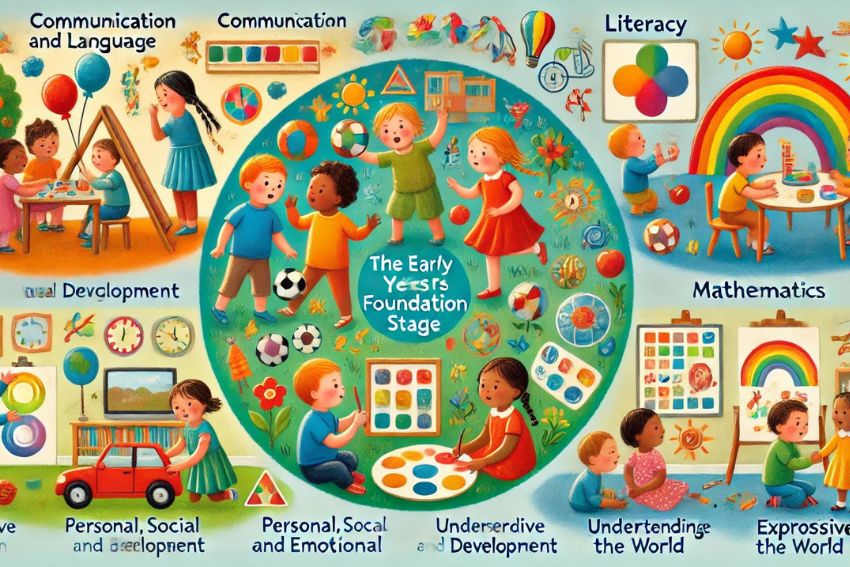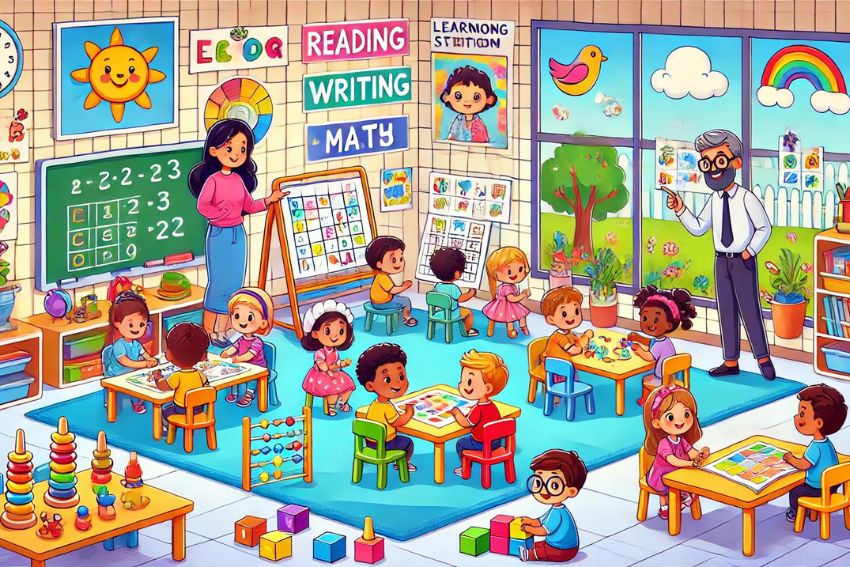
Early Years Foundation Stage (EYFS) would not exist without any child from birth to five years, whoever it is, living within England, it takes a holistic approach to early childhood education in relation to every portion of growth that a child may have. Thus, this is the guide that establishes seven key areas of learning relating to EYFS – why they are important and how they relate to practice for parents as well as professionals.
These 7 areas of learning have been further divided into three prime and four specific areas. The first three prime areas are instrumental in laying an effective base for the children’s success in other areas of learning. These three prime areas develop basic skills, particularly in communication, physical development, and personal, social, and emotional development. The prime areas form the foundation, allowing specific areas to build on these skills to enhance children’s understanding of literacy, mathematics, the world around them, and creative expression.
These 7 areas consequently bring about an integrated whole within the Early Years Foundation Stage, thus meeting a wide range of each child’s different needs. This not only sets them well for success in their future education but also lays the basic foundation for their entire well-being and personal growth. This guide will explore each of the seven areas, focusing on their importance, key aims, and how to promote development in each area.
Areas of Learning
Communication and Language
- This area focuses on developing children’s listening, attention, understanding, and speaking skills. Effective communication is the cornerstone of learning and social interaction.
- Encourage storytelling, singing songs, and engaging in conversations to enhance language skills.
Physical Development
- Physical development involves improving children’s coordination, control, and movement. It also emphasizes the importance of physical activity and healthy choices.
- Provide opportunities for active play, such as climbing, running, and ball games, alongside fine motor activities like drawing and using scissors.
Personal, Social, and Emotional Development (PSED)
- PSED is about helping children understand their own emotions and those of others, fostering self-confidence, and building positive relationships.
- Role-playing, group activities, and discussions about feelings can support this development.
Literacy
- Literacy development is crucial for children’s reading and writing skills. This area includes phonics, vocabulary, and comprehension.
- Reading books, playing word games, and encouraging writing activities can ignite a love for literacy.
Mathematics
- Mathematics in the EYFS involves developing skills in counting, understanding numbers, and recognizing patterns and shapes.
- Use everyday objects for counting, explore shapes through puzzles, and engage in simple addition and subtraction games.
Understanding the World
- This area encourages children to explore and make sense of the world around them, including their community and the natural environment.
- Nature walks, using technology for research, and learning about different cultures and traditions enhance this understanding.
Expressive Arts and Design
- This area allows children to express themselves through art, music, dance, role-play, and storytelling.
- Provide various materials for creative projects, encourage musical activities, and facilitate imaginative play sessions.
Early Learning Goals

Research showed that the Early Learning Goals are the goals set in the EYFS to enumerate the expected outcomes for children at the reception stage of learning. The goals are sets of standards by which the assessment of the child’s progress can read. All the areas are well-rounded, thereby contributing to a holistic approach to the early years of children. Consequently, here is an in-depth description of the various areas and the goals that define each.
Communication and Language
This area focuses on developing children’s ability to communicate effectively. Firstly, it involves listening and attention, understanding, and speaking skills. Furthermore, strong communication skills are essential for children to express their needs, build relationships, and engage in learning activities.
- Interactive Storytelling – Engaging children in storytelling and role-playing enhances their listening and speaking abilities.
- Songs and Rhymes – Singing nursery rhymes and songs helps children develop their vocabulary and phonological awareness.
According to a study by the National Literacy Trust, early engagement in storytelling and singing is linked to better language skills and later academic success.
Physical Development
This area focuses on improving children’s physical coordination, control, and movement. It also emphasizes the importance of physical activity and healthy lifestyle choices. Physical development is crucial for overall health, enabling children to explore their environment and engage in various activities.
- Outdoor Play – Activities like climbing, running, and jumping support gross motor skills.
- Fine Motor Skills Development – Drawing, cutting with scissors, and playing with building blocks enhance fine motor control.
The British Heart Foundation reports that regular physical activity in early childhood promotes better physical health and mental well-being.
Personal, Social, and Emotional Development (PSED)
PSED focuses on helping children understand their own emotions and those of others, develop self-confidence, and build positive relationships. Emotional intelligence and social skills are foundational for children’s overall well-being and future success.
- Emotion Coaching – Teaching children to identify and express their emotions helps them develop self-regulation skills.
- Group Activities – Encouraging cooperative play and teamwork fosters social skills and relationship-building.
Studies have shown that children with strong PSED skills are more likely to succeed academically and socially.
Specific Areas of Learning
Literacy
- Shared Reading – Reading books together and discussing them helps develop comprehension and vocabulary.
- Writing Practice – Providing various writing materials and opportunities for children to write significantly enhances their writing skills. For instance, access to different types of paper, pens, and notebooks encourages creativity and expression. Moreover, incorporating writing activities into daily routines, such as journaling or writing letters, further develops their ability to articulate thoughts. Additionally, offering constructive feedback and celebrating their writing achievements fosters a positive attitude towards writing. Consequently, children become more confident and proficient writers.
The National Literacy Trust indicates that children who enjoy reading are more likely to develop strong literacy skills.
Mathematics
This area involves developing numerical skills, understanding shapes, spaces, and measures, and fostering problem-solving abilities. Early mathematical skills are strong predictors of later academic success in various subjects.
- Counting Games – Using everyday objects for counting and sorting helps children understand numbers.
- Shape and Pattern Exploration – Puzzles and building blocks promote spatial awareness and pattern recognition.
A report by the Department for Education, furthermore, highlights the importance of early math skills in predicting future academic performance.
Understanding the World
This area encourages children to explore and understand their environment, communities, and the natural world. Furthermore, it fosters curiosity, critical thinking, and an appreciation for diversity.
- Nature Walks – Exploring the outdoors and observing plants and animals enhance understanding of the natural world.
- Cultural Celebrations – Learning about different cultures and traditions promotes respect for diversity.
Exposure to diverse environments and cultures enriches cognitive development and empathy
Expressive Arts and Design
This area not only allows children to express themselves through art, music, dance, and imaginative play, but also supports emotional expression, fine motor skills, and cognitive development.
- Art Projects -Providing various materials for drawing, painting, and crafting encourages creativity.
- Music and Movement – Singing, dancing, and playing instruments promote artistic expression and coordination.
Engaging in creative arts is linked to improved emotional regulation and cognitive development in children.
To Sum-Up
The seven areas of learning in the EYFS framework are integral to providing a well-rounded and comprehensive early childhood education. Firstly, by focusing on these areas, educators and parents can ensure that children develop crucial skills and knowledge. Consequently, this will serve as the foundation for their future learning and personal growth.
The prime areas—Communication and Language, Physical Development, and Personal, Social, and Emotional Development—are vital for igniting children’s curiosity. Moreover, they enhance their physical capabilities, while also fostering emotional intelligence and social skills. These areas set the stage for the more specific areas of Literacy, Mathematics, Understanding the World, and Expressive Arts and Design, which further enrich children’s educational experiences and prepare them for the challenges of primary education and beyond.
By integrating these areas into everyday learning activities, creating stimulating environments, and engaging in interactive and supportive practices, parents and educators can therefore support holistic development. This approach not only nurtures academic skills but also promotes overall well-being, creativity, and a love for learning.
For parents seeking additional support, early years tutors can indeed play a crucial role. Specifically, these tutors specialise in the EYFS framework and, moreover, can provide personalised guidance and educational activities tailored to each child’s unique needs. Early Years tutors can help reinforce learning objectives, support development in specific areas, and offer strategies for parents to continue supporting their child’s growth at home.
Frequently Asked Questions
What are the Three Prime Areas of the EYFS?
The three prime areas of the Early Years Foundation Stage (EYFS) are:
- Communication and Language – This area focuses on providing children with opportunities to experience a rich language environment. Furthermore, it aims to develop their confidence and skills in expressing themselves. Additionally, children are encouraged to speak and listen in a range of situations.
- Physical Development – This area involves providing opportunities for young children to be active and interactive, and to develop their coordination, control, and movement. It also includes helping children to understand the importance of physical activity and making healthy choices in relation to food.
- Personal, Social, and Emotional Development – This area also helps children to develop a positive sense of themselves and others, moreover, form positive relationships and develop respect for others, furthermore, understand appropriate behaviour in groups, and ultimately have confidence in their own abilities.
What are the 7 areas of learning of the EYFS?
The seven areas of learning in the Early Years Foundation Stage (EYFS) are divided into three prime areas and four specific areas.
Prime Areas:
- Communication and Language – Developing listening and attention, understanding, and speaking skills.
- Physical Development – Focusing on movement and handling, as well as health and self-care.
- Personal, Social, and Emotional Development – Encouraging self-confidence and self-awareness, while also managing feelings and behaviour, as well as making relationships.
Specific Areas:
- Literacy – Involves reading and writing skills, thereby helping children to link sounds and letters, and subsequently begin to read and write.
- Mathematics – Developing skills in numbers, shape, space, and measure.
- Understanding the World – Guiding children to make sense of their physical world and their community is achieved through opportunities to explore, observe, and find out about people, places, technology, as well as the environment.
- Expressive Arts and Design – Enabling children to explore and play with a wide range of media and materials, as well as providing opportunities for sharing their thoughts, ideas, and feelings through a variety of activities in art, music, movement, dance, role-play, and design and technology.
What is the EYFS Framework?
The Early Years Foundation Stage (EYFS) framework is a statutory framework in the UK that sets the standards for the learning, development, and care of children from birth to five years old. Moreover, it is designed to ensure that children learn and develop well, and, furthermore, are kept healthy and safe.
- Quality and Consistency – Ensures that every child makes good progress and no child gets left behind.
- A Secure Foundation – Through planning and assessment, ensuring that teaching and learning is tailored to individual children’s needs and interests.
- Partnership Working – Between practitioners and with parents and/or carers.
- Equality of Opportunity – Moreover, it ensures that every child is included and supported, thus preventing discrimination and ensuring equal opportunities.
Key Components of the EYFS Framework:
- Learning and Development Requirements – Covers the seven areas of learning and development, as well as assessment arrangements, and the early learning goals.
- Assessment – Involves ongoing assessment to understand and support children’s learning and development. This includes the Progress Check at age two and the EYFS Profile at the end of the Reception year.
- Safeguarding and Welfare Requirements – Provides guidelines to ensure that children are kept safe and that their welfare is promoted, covering aspects such as child protection, health, safety, and wellbeing.
The EYFS framework aims to provide a balanced and broad curriculum that supports children’s development and prepares them for school and future learning.
What are the Scope of the Areas of Learning in the EYFS?
Prime Areas:
- Communication and Language – Developing listening, understanding, and speaking skills.
- Physical Development – Enhancing coordination, control, and healthy lifestyle choices.
- Personal, Social, and Emotional Development – Building self-confidence, managing emotions, and forming positive relationships.
Specific Areas:
- Literacy – Fostering reading and writing abilities.
- Mathematics – Understanding numbers, shapes, and measurements.
- Understanding the World – Exploring cultures, nature, and technology.
- Expressive Arts and Design – Encouraging creativity through art, music, and role-play.
Key Features:
- Play-based Learning – Emphasises learning through play.
- Child-centred Approach – Activities tailored to each child’s needs.
- Parental Involvement – Collaboration with parents to support development.
These areas provide a balanced foundation for children’s learning and development, preparing them for school and life.









